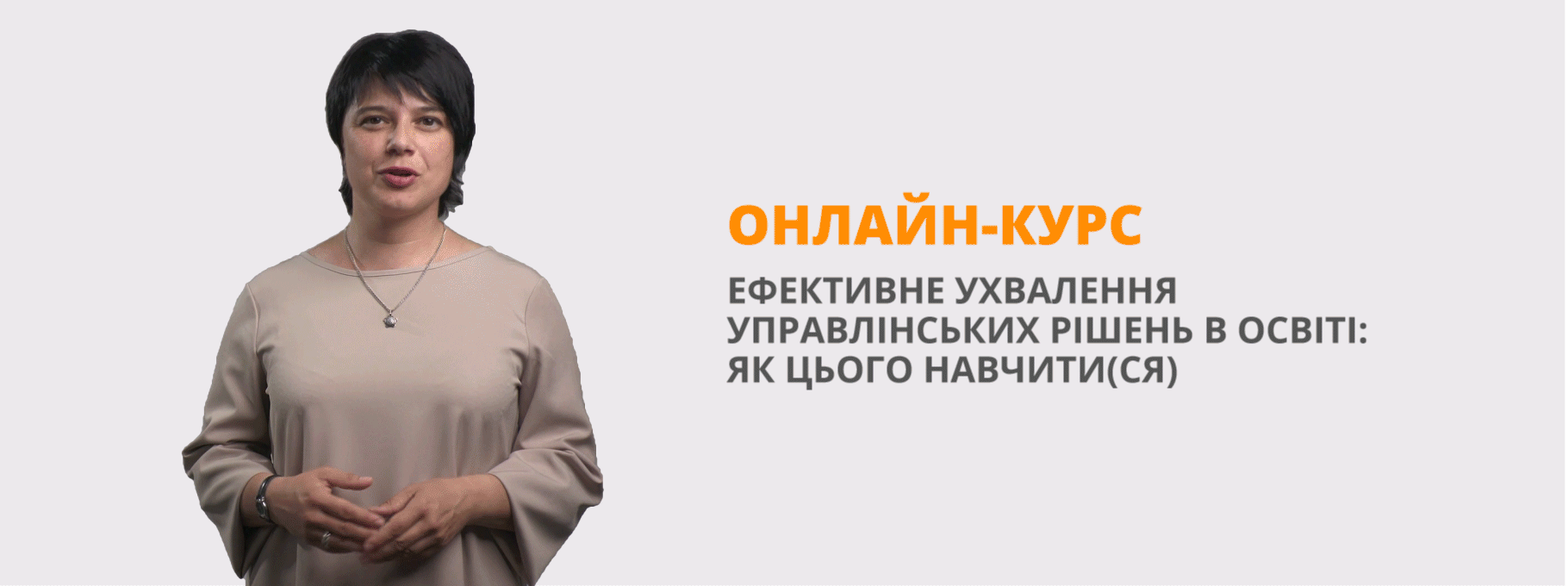Сценарій позакласного заходу на тему "Parade of English Traditions"
Parade
of English traditions
Вчитель англійської мови
Наумівської ЗОШ І – ІІІ ст.
Костюк Лілія Леонідівна
Compere: Good afternoon, dear teachers, pupils and our guests! We are glad to see you at our party!
Compere: You know, there is an English proverb “Every country has its customs”. In Britain traditions play a very important role in the life of people mostly because the British are very conservative. They are proud of their traditions and keep them carefully.
Compere: Today we are going to present you some of the most popular English traditions.
The pupils of the 6th and 8th forms will tell you about Halloween which is celebrated on October 31st.
Pupil 1: What is Halloween? Where does it come from?
Pupil 2: The story of Halloween began more then 2000 years ago from Celts who lived in Britain. At that time, New Year began on November 1st. The night before, the festival was held to mark the change from summer to winter.
Pupil 1: October 31st was the day when the sun was the lowest. It was believed that the sun entered the underworld for a short time. The gates to the underworld were open and evil spirits came out on to the Earth . To frighten these spirits away Celts lit big bonfires and dressed up as witches and ghosts.
Pupil 2: In time, November 1st became a Christian festival known as All Saints or All Hallows. The night before was called Halloween.
Pupil 1: Nowadays it became a popular children’s holiday. On this day children wear special witches or vampire costumes and go from house to house tricking for candies, like this:
( The stage is filled with children in masks, dressed up as witches and ghosts. They carry pumpkins cut as faces in their hands.)
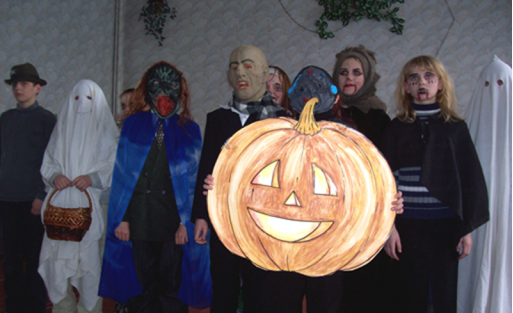
Pupils in costumes: Trick or treat,
Trick or treat,
Give us something good to eat,
Give us candy, give us cake,
Give us something good to take.
(The children are given candies.)
A pupil, holding a pumpkin: This is Jack-o-lantern. Very nice, isn’t it?
Pupil 2: The old legend says that once there was a man, whose name was Jack, and he was very bad during his life. When he died, the God punished him, he didn’t take him to the paradise. But the devil didn’t take him to the hell either
Pupil 1: The devil gave Jack a piece of coal and told him to put it into a pumpkin to give him light on his way to nowhere.
With this lantern Jack’s soul is still looking for a place to stay.
Pupil 2: That’s why pumpkin became a symbol of Halloween.
Pupil 1: Today most people don’t believe in ghosts and witches, but it is fun to wear witch costumes and to have as good time as possible!
So, let’s have fun together!
(The pupils sing and dance “Looby-Loo”)
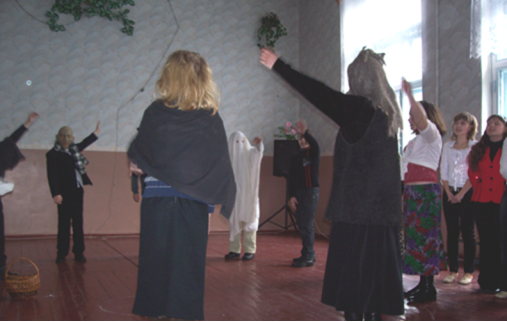
Compere: Thank you for your presentation. Now let’s give the floor to the pupils of the 7th form. They are going to present another English tradition – Christmas.
(The song “Jingle, bells!” sounds. The pupil of the 7th form, holding a branch of fur in his hands, appears on the stage. He is wearing Santa Clause’s cap )
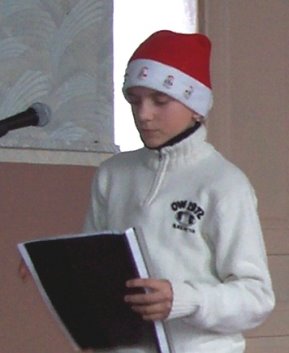 Pupil 1 : Today we are going to talk about Christmas. Do you know much about this holiday? Let's have a quiz and define the winner.
Pupil 1 : Today we are going to talk about Christmas. Do you know much about this holiday? Let's have a quiz and define the winner.
Quiz
- When is Christmas celebrated in England? (on December 25th)
- Who decorated the first Christmas tree? (the Germans)
- What is a traditional Christmas dish? (Christmas pudding, turkey)
- Who brings presents to children on Christmas? (Santa Claus)
- Where does Santa Claus put presents for children? (in the stockings near the fireplace)
- What songs do English people sing on Christmas? (Carols)
- What is the most popular Christmas wish? (Merry Christmas. Peace on Earth.)
(The winners are defined and they are given prizes.
Another pupil comes to the stage, he is holding some stockings in his hands)
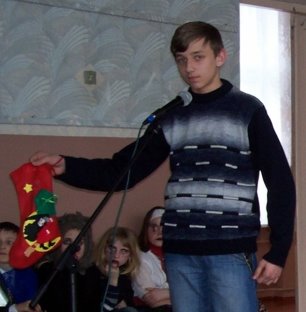
Pupil 2: You see, I'm holding several stockings in my hand. Some of you may think I'm cold and I'm going to put them on. But you're mistaken. Does anybody know what they are meant for at Christmas? Yes, they are for Christmas presents. Children in Britain put their stockings by the side of the chimney for Father Christmas or Santa Claus to put their presents in. Now, let's peep into our stockings. Will you do it and see if there is a present for you?
(The pupil comes up to some spectators and asks them to peep into the stockings and to get small presents for themselves)
Pupil 3 (comes into the middle of the hall, she has a big beautiful Christmas post-card in her hands): Oh, I see some оf уоu have already got Christmas presents. It's a very good tradition, isn't it? But there is one more pleasant thing people do before Christmas: they send Christmas Cards to their friends, relatives and beloved ones to congratulate them with the coming year and to express their wishes on this occasion.
Pupil 4: The most popular greetings on Christmas are “Peace on Earth”, “Merry Christmas”.
Pupil 5: So, we've got Christmas presents and Christmas Cards. What else do people usually do at Christmas? Yes, they sing. Carol-singing at Christmas is a very old custom. All over the country groups of people (young and old) sing in the streets and outside people's houses. The centre of carol-singing in London is Trafalgar Square. Can we sing here? Do you know any carols? If not, you may take these sheets of paper with the texts of carols and let's try to sing together.
(Pupils receive the sheets of paper with the words of the carol “Silent night”.)
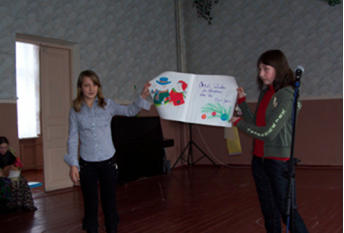
Compere: Another tradition of English people is to celebrate St.Valentine’s Day on the 14th of February. The pupils of the 10th form will present this tradition.
(Accompanied with a song of Elvis Presley “Love me, tender”, a girl and a boy appear on the stage)
Pupil 1: St.Valentine’s Day is very popular in Britain and all English-speaking countries. The 14th of February is a special day for people in love.
Pupil 2: St.Valentine is the patron saint of lovers and on the 14th of February people declare their feelings for each other. This is the legend how this holiday began.
Pupil 1: When the Roman Emperor Claudius II needed soldiers, he made a law against marriage, because he believed that single men made better soldiers, while marriage would make men want to stay at home instead of fighting wars.
Pupil 2: A kind Christian Priest Valentine saw the love of young couples, so he married them secretly against the law. But he was discovered and condemned to death. The day he died, on the 14th of February, he wrote a note to the girl he loved. He signed the note: “Your Valentine”.
Pupil 1: Nowadays in England and other countries boys and girls, and grown-ups send “valentines” to their friends, teachers, members of their family. A “valentine” is a small picture, very often a funny one with a love message, a little poem or some kind words on it.
Pupil 2: You should not write your name on it. Very often people write “Your Valentine” or “From Guess Who” and the person who receives it must guess the name of a sender.
Here some of the examples of Valentines.
(The pupils demonstrate some funny messages)
Pupil 1: British schoolchildren like to make “valentines” for their classmates and put them in a large decorated box. On February 14th the teacher opens the box and gives the “valentines” to the pupils.
Pupil 2: We also have prepared some “valentines” for you.
(The pupils bring in a large box with valentines and distribute them among the pupils)
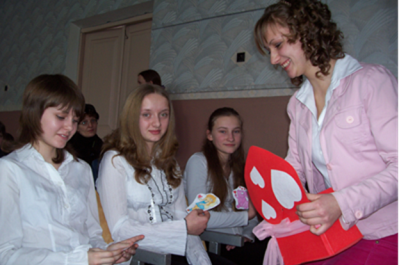
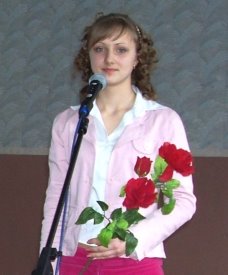
Pupil 1: Another tradition is to exchange presents and to give each other chocolates. Men usually give their girl-friends red roses, the flowers of love.
(The boy gives a red rose to a girl)
Pupil 2: You can also show your love to your sweetheart by singing a romantic song.
(The song “Yesterday” is performed)
Compere: Thank you very much. It was really a very nice song. Do you know that Ukrainian people also like to celebrate this holiday. So, now everybody can make a declaration of love on the 14th of February.
Compere: Yes, of course. Our boys and girls are really very happy and lovely on this day. But we have one more English tradition to tell you about.
The pupils of the 11th form will tell you about Pancake Day which is celebrated on Shrove Tuesday in Spring at the beginning of Lent. Lent is a period of 40 days before Easter.
(A pupil in a white apron with a frying pan in his hand appears on the stage.)
Pupil 1: Well, on this day in England families usually have pancakes for dinner. At schools the children and teachers have pancakes for school dinner, and in restaurants customers ask for pancakes, too. Everyone knows that pancakes are delicious to eat, but do you know how to cook them?
(One of the pupils in the hall tells how to cook pancakes)
Pupil 2: So, let's imagine that we have already made our pancakes. Do you know that in England people not only eat them but race with them? Now we are going to have a pancake race at our school. I invite those who will take part in the race to take frying pans with pancakes on them and to take places at the “start” line. You must run three circles tossing your pancakes 3 times in each circle during the race. The winner is a pupil who comes first and doesn't drop his pancake. So, be careful!
(The pupils run a race with frying pans in their hands, tossing the pancakes three times during each circle)
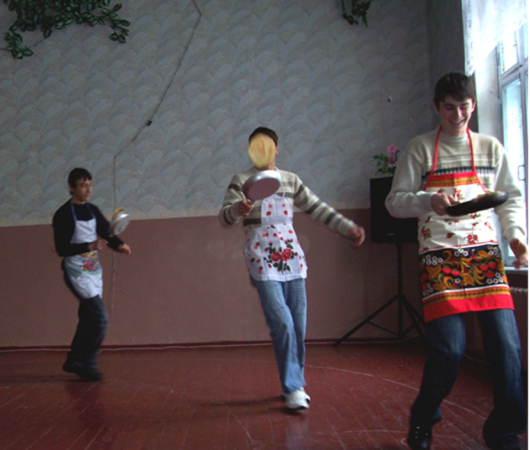
Pupil 2: Another tradition is the Pancake fight when a cook tosses a pancake high into the air. The boys fight for the pancake. The winner is the boy who gets the biggest piece of the pancake. So, now I invite you to fight for the pancake. Even if you don't win, you will get a pancake for dinner.
(Some boys come up to the compere. He tosses a pancake high into the air. The boys try to catch as big piece as possible. The winners are given hot pancakes with jam.)
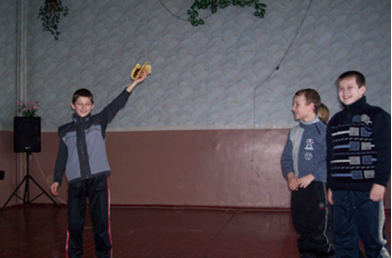
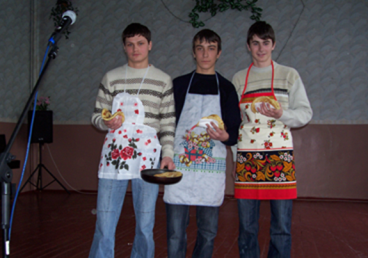
Compere: Thank you for your presentation and active participation in the competitions.
Compere: So, these are some of the numerous customs and traditions of the English people, some glimpses of their rich spiritual life.
Compere: We hope you’ve enjoyed our party!
Compere: And now we wish you all the best! Good-bye!
Література:
- Гірняк В.С. “St.Valentine’s Day – February 14”. Англійська
мова та література, №2, 2009.
- Калініна Л.В Тиждень англійської мови в школі. - Х.: Вид. група «Основа», 2008.
- Ляшенко В.П. Сценарій позакласного заходу для учнів 7-х класів “To the World of English Customs and Traditions”, Англійська мова та література, №16, 2006.
1


про публікацію авторської розробки
Додати розробку
